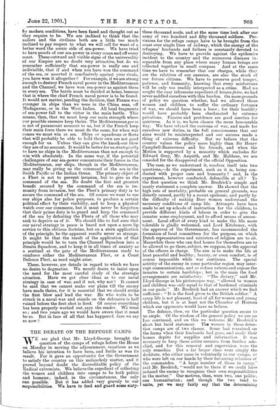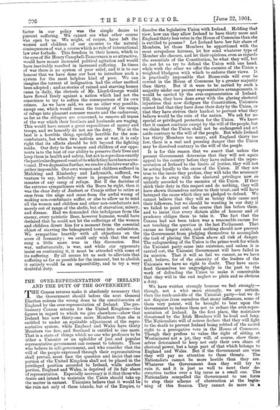THE DEBATE ON THE REFUGEE CAMPS W E are glad that
Mr. Lloyd-George brought the question of the camps of refuge before the House on Monday in moving the adjournment, vexatious as we believe his intention to have been, and futile as was its result. For it gave an opportunity for the Government to satisfy the country on this melancholy matter, and it proved beyond doubt the discreditable policy of the Radical extremists. We believe the expedient of collecting the women and children into camps to be both politic and humane; indeed, in the circumstances, the only one possible. But it has added very gravely to our responsibilities. We have to feed. and guard some sixty- three thousand souls, and at the same time look after our army of two hundred and fifty thousand soldiers. Pro- visions for the refuge camps have to be brought from the coast over single lines of railway, which the energy of the refugees' husbands and fathers is constantly' devoted to destroying. We have to provide against the epidemics incident to the country and the numerous diseases in- separable from any place where many human beings are collected together in small compass. And at the same time we have to remember that our charges, while they are the relatives of our enemies, are also the stock of our future citizens. We have to preserve good temper, patience, and humanity, knowing that every misfortune will be only too readily interpreted as a crime. Had we sought the easy inhumane expedient of laissez-faire, we had never saddled ourselves with this burden. On mere grounds of policy we question whether, had we allowed those women and children to suffer the ordinar7 fortunes of war, we should have been a loser ; for their hostility would have probably been checkmated by extreme privations. Famine and pestilence are good sureties for quietness. As it is, we have chosen the more honourable way. We have relaxed the customs of war, and made for ourselves new duties, in the full consciousness that our aims would be misinterpreted and our success made a thing of extreme difficulty. But we believe that the country values the policy more highly than Sir Henry Campbell-Bannerman and his friends, and when the Motion is supported by a minority which excludes Sir Edward Grey, Mr. Asquith, and Mr. Haldane, we are consoled for the disapproval of the official Opposition.
The case, as we understand it, resolves itself into two questions,—Is the experiment, such as it is, being con- ducted with proper care and humanity ? and, Is the experiment, however conducted, defensible at all ? To the first question we think Mr. Brodrick's simple and manly statement a complete answer. He showed that the high rate of mortality, probable on general grounds, was directly caused, partly by a recent epidemic, and partly by the difficulty of making Boer women understand the necessary conditions of camp life. Attempts have been made to set up schools of instruction for the children, to provide different kinds of labour in order to give the inmates some employment, and to afford means of amuse- ment. Local effort of every End to make the life more tolerable is gladly welcomed, and Lord Kitchener, with the approval of the Government, has recommended, the formation of local committees for the purpose, on which Dutch representatives and ministers of religion are to sit. Meanwhile those who can find homes for themselves are to be allowed to go there, subject, we suppose, to the approval of the officers in charge. The aim is to make the life at least peaceful and healthy;. luxury, or even comfort, is of course impossible while war continues. The special activity of the enemy in some particular region may inter- rupt communications, and so reduce rations and expose the inmates to certain hardships ; but in the main the food arrangements are satisfactory. "The dietary," said Mr. Lloyd-George in his picturesque way, "allowed to women and children was only equal to that of hardened criminals in our gaols." Mr. Brodrick had an answer which we find sufficient : "It is the food given to the British soldier." A camp life is not pleasant, least of all for women and young children, but it is at least not the Chamber of Horrors which our opponents would have us believe.
The defence, then, on the particular question seems to us ample. Of the wisdom of the general policy we are no less convinced, and on this we welcome Mr. Brodrick's short but lucid statement. The women in these deten- tion camps are of two classes. Some had remained on the farms when their husbands had gone, and, made their homes depots for supplies and information. It was necessary to keep these active enemies from further mis- chief, and for this removal and supervision were the only remedies. But a far larger class were simply the destitute, who either came in voluntarily to our camps, er who were left on our hands by their far-seeing relatives of the commandos. "A large number of those in camp," said Mr. Brodrick, "would not be there if we could have induced the enemy to recognise their own responsibilities in the matter." Our motives, then, were two, one politic, one humanitarian; and though the two tend to unite, yet we may fairly say that the determining factor in our policy was the simple desire to prevent suffering. We cannot see what other ' course was open to us. We might, of course, have left the woMen and children of our enemies to the natural cbusequences of war, a course which no rule of international law ever forbade. This freedom in their homes, -which to the eyes of Sir Henry Campbell-Bannerman is so attractive, would have meant increased political agitation and would have inevitably resulted in increased suffering. In times of war there is no system of poor relief, and it is to our honour that we have done our best to introduce such a aystem for the most helpless kind of poor. We can imagine the torrent of indignation had the other method been adopted ; and as stories of ruined and starving homes came in daily, the rhetoric of Mr. Lloyd-George would have flowed freely against a nation which had not the conscience to try to soften the consequences of its own' crimes. As we have said, we see no other way possible, except one, which would mean the turning of the camps of refuge into pleasant summer resorts and the endeavour, as far as the refugees are concerned, to remove all traces of the war which their brothers and husbands are waging. This would have meant a great expenditure of money and troops, and we honestly do not see the duty. War at the best is a horrible thing, specially horrible for the non- combatants, but when two nations are at war, it is only right that its effects should be felt beyond the fighting ranks. Our duty to the women and children of our oppo- nents is to the best of our ability to preserve their lives and keep them in health and safety, but not to reproduce exactly the particular degree of comfort to which they have been accus- tomed. If we dogmatise further, we render a decisivewar alto- gether impossible. Our own women and children suffered in Mafeking, and Kimberley and Ladysmith, suffered, we 'Venture to say, infinitely more in proportion than the inmates of any camp of refuge. But if the doctrine of the extreme sympathisers with the Boers be right, then it was the clear duty of Joubert or Cronje either to retire at once from the siege and cease from the awful wrong of making non-combatants suffer, or else to allow us to -send all the women and children and other non-combatants not merely out of range of the shells, but of starvation; misery-, and disease. Had we demanded this indulgence from the enemy, every patriotic Boer, however humane, would have declared that he could not let the sufferings of the women and children divert him for a' moment from' the essential ebject of starving the beleaguered towns into submission. We sympathise heartily- with all objections on the score of humanity ; we could' only wish that' the word rang a little more true in this discussion. But war, unfortunately, is war, and while our opponents insist on continuing it, it must be attended with some of its suffering. By all means let us seek to alleviate that suffering as far as possible for the innocent, but to abolish it entirely would be an impossibility, and to try a very doubtful duty.











































 Previous page
Previous page